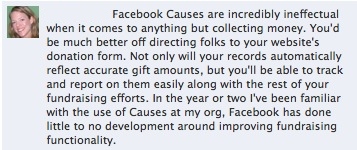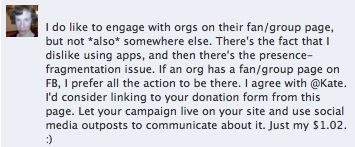I recently set up a Facebook Cause for Aspiration, the mama org of Social Source Commons. It was simple and in only a few minutes I had created an Aspiration Cause that I could use to find supporters and receive donations. My motivation wasn’t to start the grand “Help Aspiration Save the World!” fundraising campaign but rather simply to educate myself on Causes for if we ever decide to use it (as the last decision in the fundraising discussion) or to help those who ask about it as a fundraising option.
Experience from Facebook Causes Users
I asked our Facebook followers what they thought about Causes and got some interesting and insightful responses:



The concerns raised from our followers seems to echo a kind of shared attitude toward Facebook Causes in the nonprofit tech world since the initial “This app will raise thousands of dollars for us!!” phase that happened when it first came out:
- To Nonprofits Seeking Cash, Facebook App Isn’t So Green
- Project Agape’s Causes Does Not Report December Numbers
What does a Facebook Cause user look like?
Fundraising is a funny beast, though. To look at it you’re really looking into human altruistic psychology and let’s face it, I couldn’t tell you the difference between a Rorscach and a Horshack. But for the non-Psych majors among us, we can still look at some basic information to get a better idea of if and when Facebook Causes is effective.
For example, one observable bit of info is that organizations that have done well with Facebook Causes (Save Darfur, Nature Conservancy, Campaign for Cancer Prevention) seem more to do with broad situations like stopping cancer or those removed from the donors like disaster relief. Donors want to feel involved and invested in the cause to which they are giving and donating through the internet allows supporters to easily get involved in a situation that they would otherwise have to simply watch on the news. These organizations with large, broadly-recognized problems to solve seem to do better than those with a more specific audience or purpose.
But let’s assume that small nonprofits and causes can and do still find value in Facebook Causes. What would the motivation be for someone who is donating through Facebook Causes? I think here again we can make a few assumptions: 1. Those who donate through Facebook Causes are probably going to be a small subset of your donors. 2. Those who would donate through Causes are generally tech-savvy, like to take advantage of new trends quickly, tend to be more impulsive givers and interact with the org they are donating to mostly online. Do these characteristics sound right in describing someone who would give through Causes? How do they match up with your donor base?
Analyzing Your Donors
But this removed, looking-down-on-the-world view of your donors can only give you some theoretical data. Similar to our blog post about Nonprofit Social Media Audience Assessment, I am an advocate for talking to your donor base about what they do. Just as you can ask your social media followers why they are following you, you can ask your donors: why do you give? Is it because you make it easy? Have an inspiring mission or projects? Is it because they’ve met you in person and were moved by your story? On top of this, you can analyze when and how your donors give money. What is the percentage given through your website? Is it unprovoked by your organization or in response to a campaign? What is the median age of your donors? All of this donor assessment information becomes the raw material to begin any technology discussion rather than using it as something to compare against when the technology is already implemented. Any technology solution/implementation that your organization is looking at should be an attempt to meet your audience’s needs.
Facebook Causes may have some mixed reviews, but like any other piece of technology, the decision to add it as a piece of your fundraising puzzle should be last after asking yourself why and talking to the people who would actually be using it.
What are your thoughts?








Recent Comments